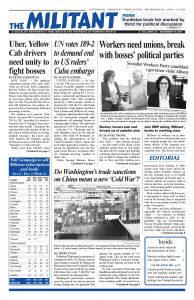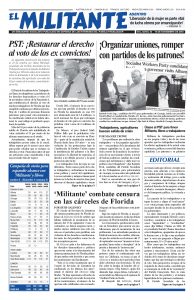UNITED NATIONS — On Nov. 1, for the 27th year in a row, the U.N. General Assembly adopted a resolution presented by the Cuban government calling for “ending the U.S. economic, commercial and financial embargo against Cuba.” The resolution passed by a 189-2 margin, similar to recent years, with the U.S. and Israeli governments voting against, and those from Ukraine and Moldova not voting.
Seeking to blunt the effect of the vote, the U.S. government proposed eight amendments, all smearing Havana as a human rights violator. The eight were rejected, by a 114-3 vote in most cases.
Only the U.S., Ukrainian, and Israeli delegates voted for the amendments. More than 60 abstained, including the representatives of the United Kingdom, France, Japan and most other imperialist countries. Also among the abstentions were the delegates from Mexico, Argentina, Brazil, Colombia and Iraq. Another 10 didn’t vote.
Cuban Foreign Minister Bruno Rodríguez presented the resolution. He explained that Washington has sought to overthrow Cuba’s socialist revolution since 1959, when workers and farmers, led by Fidel Castro and the Rebel Army, toppled the U.S.-backed Batista dictatorship, took state power and overturned capitalist rule. For nearly six decades since, the U.S. ruling class, under Democratic and Republican administrations alike, has carried out military, political, and economic assaults against Cuba’s working people and their government.
Impact of U.S. economic war
Rodríguez quoted from an April 1960 U.S. State Department memorandum that spelled out the U.S. rulers’ goal: working at “alienating internal support” for the revolution through moves “to bring about hunger, desperation, and overthrow of [the] government.”
Rodríguez reported that the decadeslong U.S. sanctions have caused billions in economic losses affecting the daily lives of Cubans, from blocking the import of vital medical supplies to hindering Cuba’s foreign banking and credit transactions. Washington has fined U.S. subsidiaries abroad as well as foreign banks and companies for using U.S. dollars trading with Cuba.
One example, cited in a report submitted by the Cuban delegation, is the impact on the national airline Cubana de Aviación. The embargo has severely limited its ability to buy or lease aircraft or obtain spare parts, which jeopardizes maintenance and flight safety for Cuba’s aging fleet.
Rodríguez noted that Washington continues to restrict the right of U.S. citizens to travel to Cuba. In the last year it has also sharply limited the ability of Cubans to obtain visas to visit family in the U.S.
During the debate numerous delegates, especially from Latin America, the Caribbean, and Africa, not only called for lifting the embargo, but expressed their gratitude for the solidarity they have received from Cuban internationalist volunteers.
Several speakers highlighted the role of Cuban health care workers who led the fight to curb the Ebola epidemic in West Africa in 2014–15. South African Ambassador Jerry Matjila pointed to “Cuba’s contributions to the liberation of South Africa from apartheid,” when hundreds of thousands of Cuban volunteer combatants went to Angola between 1975 and 1991, helping to defeat U.S.-backed invading troops of the white-supremacist regime.
St. Vincent Ambassador Inga Rhonda King said Cuban universities have graduated hundreds of youth from that West Indian island, while Cuban doctors working in St. Vincent “have brought quality medical care and expertise to the most remote areas of our country”— all free of charge. Cuban workers helped build a modern hospital there “and our first international airport,” she said.
U.S. ‘amendments’ to smear Cuba
The eight amendments introduced by U.S. Ambassador Nikki Haley charged the revolutionary government of Cuba with suppression of free speech, arbitrary detentions, violating trade union rights, denying women adequate representation in government bodies and other alleged violations of human rights.
Haley cynically claimed “our reason for the embargo is and has always been Cuba’s denial of freedom and the denial of the most basic human rights for the Cuban people.”
In response, Cuban Foreign Minister Rodríguez said, “The blockade represents flagrant, massive and systematic violations of the human rights of Cuban women and men.” He added that “the U.S. government doesn’t have the least moral authority to criticize Cuba or anyone else on human rights.”
Rodríguez noted that Washington is the only government to have unleashed nuclear weapons on a civilian population, as it did in Japan in 1945. The U.S. government still holds prisoners indefinitely without charges on its naval base in Guantánamo, Cuba. “And in Florida, 21 percent of Blacks are denied the right to vote” because they previously served felony prison sentences.
A large majority in the General Assembly rejected the U.S. amendments. Some 76 delegates — nearly 40 percent — either abstained or didn’t vote on the amendments, taking their distance from Cuba on Washington’s “human rights” charges.
The Canadian ambassador said his vote against the amendments was not against “the substance” of the U.S. proposals, but that the debate on the embargo was “not a suitable platform” for that discussion. The Austrian representative, who abstained, made similar remarks on behalf of the European Union. Washington’s imperialist rivals are just as hostile to Cuba’s socialist revolution as the U.S. rulers, but they resent the way the embargo restricts their own trade with Cuba.
Bipartisan policy against revolution
In 2016 the U.S. government under President Barack Obama abstained on the embargo resolution, registering the U.S. ruling class’s recognition that — thanks to the determination of Cuban working people — the embargo had failed to bring down the revolution. The Obama White House shifted tactics, with the same goal. The Trump administration has not reversed the 2015 re-establishment of diplomatic relations with Cuba, but has tightened some sanctions.
Two weeks before the General Assembly vote the U.S. Mission to the U.N. organized an event inside the U.N. Building titled “Jailed for What?” The speakers, including U.S. State Department officials and a Cuban counterrevolutionary living in Spain, accused Havana of holding prisoners for their political beliefs.
Cuban Ambassador Anayansi Rodríguez had formally protested the event as contrary to U.N. rules of protocol. Members of the Mission intervened and chanted slogans throughout the program to drown out the speakers. Secretary of State Mike Pompeo called the disruption “a childish temper tantrum” and demanded U.N. officials take action against Cuba.
On the same day as the U.N. vote on the embargo resolution, National Security Adviser John Bolton announced in Miami that Washington was considering imposing further sanctions.
Rodríguez said Cuba’s revolutionary government is ready to talk with the U.S. government “on the basis of mutual respect, as equals.” But, he told the General Assembly, “we will never make concessions that harm our sovereignty and national independence.”

